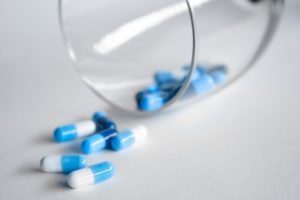
Photo by Pietro Jeng from Pexels
Can Antibiotics cause Diarrhea?
The answer is“YES”
Antibiotic associated diarrhea means passing loose or watery stools at least three times a day after taking antibiotics (medications used to treat bacterial infections). Antibiotic-associated diarrhea is one of the most common adverse events due to antibiotic use.
While antibiotics are fighting infection, they can also kill the good bacteria in your intestinal tract. This may disrupt the delicate balance in your intestines, allowing bad intestinal bacteria that are resistant to the antibiotic to increase, leading to diarrhea. Few epidemiology studies in Malaysia reported a high prevalence of Clostridium difficile infection, ranging from 6 to 14%.1-2Few types of antibiotics have been related with C. difficile diarrhea and colitis, such as clindamycin, ampicillin and cephalosporins. C. difficile overgrowth can lead to pseudomembranous colitis, which is a more severe bowel inflammation. These patients are at risk of developing toxic megacolonthat will show up on a computed tomography (CT) scan, which can lead to bowel perforation and sepsis.
Most often, antibiotic associated diarrhea is mild and requires no treatment. The diarrhea typically clears up within a few days after you stop taking the antibiotic. However, for C. Difficile diarrhea, your doctor may start antibiotics (metronidazole or vancomycin) for you. Most C. difficile diarrhea usually improve within the first 72 hours of treatment.
How to avoid antibiotics associated diarrhea?
Avoid unnecessary antibiotics!
Only take antibiotics after you consult your doctor.
If you’re taking an antibiotic, consider to avoid foods that commonly trigger diarrhea, such as dairy products, fatty foods, spicy foods, and foods high in fiber. You should also avoid caffeine and alcohol.
When do you need treatment for antibiotics associated diarrhea?
If your symptoms of antibiotic-associated diarrhea are severe, such as fever, abdominal pain, high volume, watery diarrhea, or bloody diarrhea, you should consult your doctor. You need bed rest, or sometimes antidiarrhea medicationto relieve the symptoms. You may even need intravenous fluids to replace your electrolytes and another antibiotic to treat the bad intestinal bacteria that is causing diarrhea.
Do probiotics help in treating or preventing antibiotics associated diarrhea?
Probiotics add helpful bacteria to your digestive system. They don’t have any effect on the antibiotic treatment. They only treat the side effects.The most commonly studied bacteria for antibiotic associated diarrhea are Lactobacillus rhamnosus-based and Saccharomyces boulardii-based probiotics.
By Dr Chieng Jin Yu, Medical Lecturer, Consultant Gastroenterologist and Hepatologist, Universiti Putra Malaysia (UPM).
References:
- Hassan SA, Othman N, Idris FM, Abdul Rahman Z, Maning N, Abdul Rahman R, Tiong CG. 2012. Prevalence of Clostridium difficiletoxin in diarhoeal stool samples of patients from a tertiary hospital in North Eastern Peninsular Malaysia. Med J Malaysia 67:402–405.
- Syuhada N, Azimatun N, Alfizah H, Tzar M, Ramliza R. 2013. Clostridium difficileinfection: clinico-epidemiological perspective. Med Health 8:64–72.
[This article belongs to The Malaysian Medical Gazette. Any republication (online or offline) without written permission from The Malaysian Medical Gazette is prohibited.]
